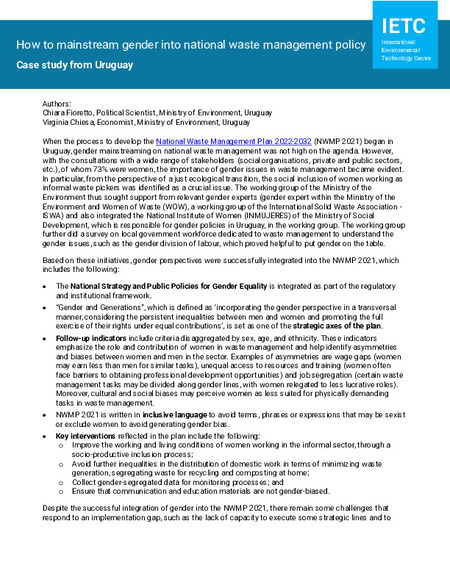| dc.contributor | Industry and Economy Division | en_US |
| dc.contributor.author | Fioretto, Chiara | en_US |
| dc.contributor.author | Chiesa, Virginia | en_US |
| dc.coverage.spatial | Uruguay | en_US |
| dc.date.accessioned | 2025-05-19T07:15:08Z | |
| dc.date.available | 2025-05-19T07:15:08Z | |
| dc.date.issued | 2025-05 | |
| dc.date.submitted | 2025-05 | |
| dc.identifier.uri | https://wedocs.unep.org/20.500.11822/47570 | |
| dc.description | When the process to develop the National Waste Management Plan 2022-2032 (NWMP 2021) began in Uruguay, gender mainstreaming on national waste management was not high on the agenda. However, with the consultations with a wide range of stakeholders (social organisations, private and public sectors, etc.), of whom 73% were women, the importance of gender issues in waste management became evident. | en_US |
| dc.format | pdf | en_US |
| dc.language | English | en_US |
| dc.subject | gender mainstreaming | en_US |
| dc.subject | waste management | en_US |
| dc.subject | policy making | en_US |
| dc.subject | Uruguay | en_US |
| dc.title | How to mainstream gender into national waste management policy - Case study from Uruguay | en_US |
| dc.type | Factsheets, Infographics and Brochures | en_US |
| wd.identifier.sdg | SDG 5 - Gender Equality | en_US |
| wd.topics | Environmental Governance | en_US |
| wd.identifier.pagesnumber | 2 | en_US |
| wd.identifier.mettingsession | Gender and Waste: How to mainstream gender into national waste management policy. 28 November 2023 | en_US |


